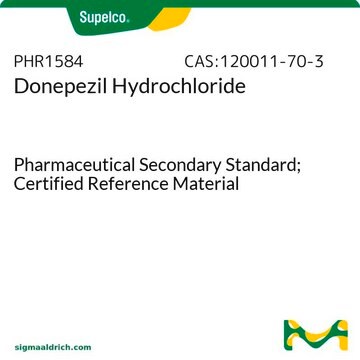D6821
Donepezil hydrochloride
≥98% (HPLC), powder, acetylcholinesterase inhibitor
Synonym(s):
1H-Inden-1-one, 2,3-dihydro-5,6-dimethoxy-2-[[1-(phenylmethyl)-4-piperidinyl]methyl]-, hydrochloride, E2020
About This Item
Recommended Products
product name
Donepezil hydrochloride, ≥98% (HPLC)
Assay
≥98% (HPLC)
form
powder
storage condition
desiccated
color
white to off-white
solubility
DMSO: ≥20 mg/mL
H2O: ≥20 mg/mL
storage temp.
room temp
SMILES string
O=C1C(CC2CCN(CC3=CC=CC=C3)CC2)CC4=CC(OC)=C(OC)C=C41.[H]Cl
InChI
1S/C24H29NO3.ClH.H2O/c1-27-22-14-19-13-20(24(26)21(19)15-23(22)28-2)12-17-8-10-25(11-9-17)16-18-6-4-3-5-7-18;;/h3-7,14-15,17,20H,8-13,16H2,1-2H3;1H;1H2
InChI key
HLJIZAKUNCTCQX-UHFFFAOYSA-N
Gene Information
human ... ACHE(43)
Looking for similar products? Visit Product Comparison Guide
Application
Biochem/physiol Actions
Features and Benefits
Signal Word
Danger
Hazard Statements
Precautionary Statements
Hazard Classifications
Acute Tox. 2 Oral - Eye Irrit. 2
Storage Class Code
6.1A - Combustible acute toxic Cat. 1 and 2 / very toxic hazardous materials
WGK
WGK 3
Flash Point(F)
Not applicable
Flash Point(C)
Not applicable
Certificates of Analysis (COA)
Search for Certificates of Analysis (COA) by entering the products Lot/Batch Number. Lot and Batch Numbers can be found on a product’s label following the words ‘Lot’ or ‘Batch’.
Already Own This Product?
Find documentation for the products that you have recently purchased in the Document Library.
Customers Also Viewed
Our team of scientists has experience in all areas of research including Life Science, Material Science, Chemical Synthesis, Chromatography, Analytical and many others.
Contact Technical Service










![(E)-2-[(1-Benzylpiperidin-4-yl)methylene]-5,6-dimethoxyindan-1-one(Donepezil Related Compound A) Pharmaceutical Secondary Standard; Certified Reference Material](/deepweb/assets/sigmaaldrich/product/images/201/641/49c7b91b-630d-4c54-9fe2-8ac8e483c7cd/640/49c7b91b-630d-4c54-9fe2-8ac8e483c7cd.jpg)
